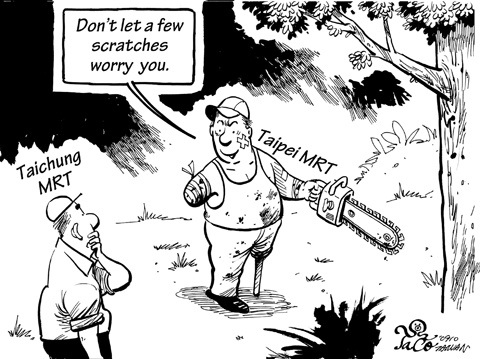ˇ@

ˇ@
ˇ@
To be
Taiwan, or not to be?
ˇ@
Monday, Oct 12, 2009,
Page 8
Is it just me, or is Taiwan heading toward being the first country in the world
to turn away from its young and troubled but fully functioning democracy to
become part of a gravely troubled autocracy?
China is facing troubling economic problems, with 25 million recently unemployed
workers adding to a real possibility of unrest across the nation. The apparent
increase in corruption at all levels of government; the rapidly widening gap
between the abominably poor and the obscenely rich; and non-existent quality
control mechanisms make China a very bad choice for any kind of trade agreement,
especially under a ˇ§one Chinaˇ¨ policy.
Is our government really that weak, naive and shortsighted? Does it truly
believe that the territory of the Republic of China includes the territory of
the Peopleˇ¦s Republic of China and that signing an agreement under the ˇ§one
Chinaˇ¨ policy is therefore acceptable?
Or are government officials positioning themselves in view of Chinaˇ¦s leaders so
that, when their much-sought prize of unification is delivered, they will enjoy
great benefits and preferential treatment ˇX possibly even offers of positions in
the Chinese Communist Party?
Anyone who has spent time studying the history of China ˇX in particular the
historical, ideological and emotional differences between Nationalists and
Communists ˇX would agree that this cannot happen.
How many Tibetan leaders, pro-China or not, were given high level positions
and/or benefits that went beyond a few face-giving ceremonies and banquets?
Hello, anybody home?
What can Taiwan do, given that it is burdened by the shortcomings of a ˇ§countryˇ¨
that isnˇ¦t recognized as such and doesnˇ¦t behave like one because of political
complexity and historical distortions ˇX not to mention the short-term,
financially oriented thinking and planning of its government and citizenry?
First, letˇ¦s focus on what we have to offer the world: Pristine and gorgeous
coastlines in the east and the south, complete with wonderful hot springs and
splendid beaches, and a central mountain range that offers some of the most
spectacular sights anywhere in Asia, as well as warm, hospitable and extremely
generous people.
We must develop and cherish these assets in an ecologically sound way, promote
sustainable long-term tourism and put in place infrastructure that can
facilitate the industry and that can expand as demand grows.
Second, Taiwan has to implement and enforce tough anti-pollution laws for
factories and farms so that our rivers and coastal areas can once again be safe
for harvesting seafood, so that river water can be used for irrigation and so
that we can provide an unpolluted and fun environment for recreational
activities. Such laws should require that all households and businesses connect
to waste water treatment plants, and it is imperative that this be achieved in
the shortest possible time.
Third, Taiwanese factories in China that produce food or goods requiring highly
skilled labor should be encouraged to return to Taiwan. Government subsidies and
tax breaks that offset ˇX at least initially ˇX higher local wages and operating
costs could boost the nationˇ¦s competitiveness.
This would maintain the high standard of Taiwanese goods as well as provide
much-needed jobs to an ailing economy. Absolutely no food products, cosmetics or
medicine should be allowed into Taiwan from China until there are rigorous and
enforceable safety procedures operating in both countries.
Most importantly, Taiwanese must stand united, believe in and strive for
Taiwanˇ¦s identity and recognition, fight for their rights and their freedom and
prove to themselves and the world that democracy is here to stay.
DAN LUTHI
Taichung
ˇ@